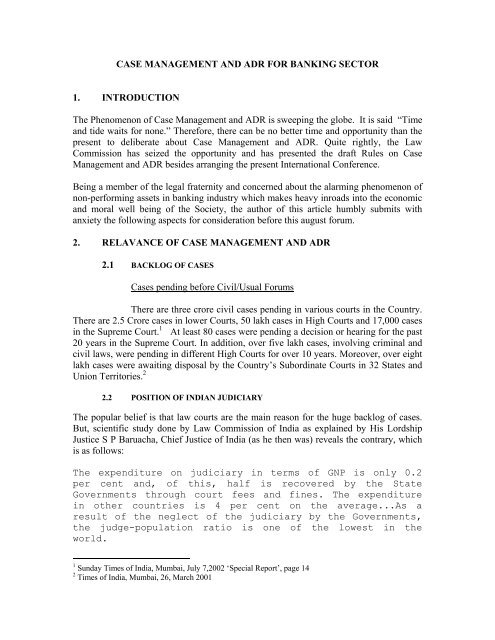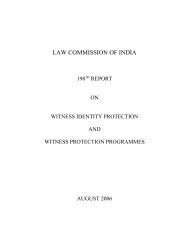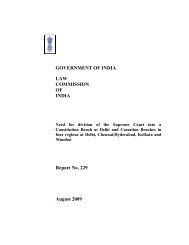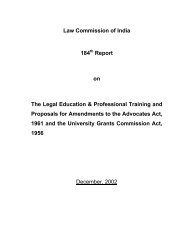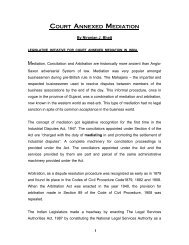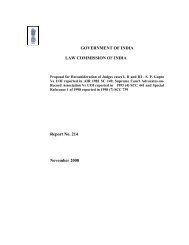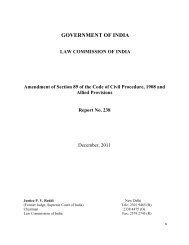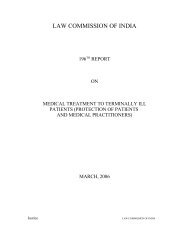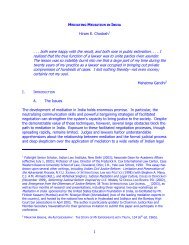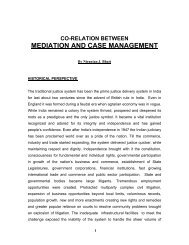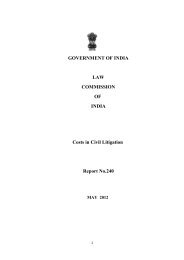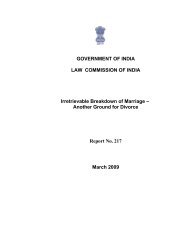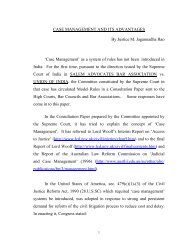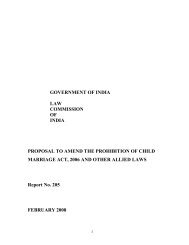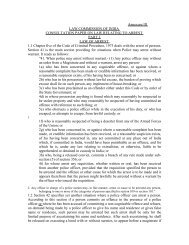case management and adr for banking sector - Law Commission of ...
case management and adr for banking sector - Law Commission of ...
case management and adr for banking sector - Law Commission of ...
Create successful ePaper yourself
Turn your PDF publications into a flip-book with our unique Google optimized e-Paper software.
5.1. EXISTING CASES: Under the present <strong>Law</strong>, recovery <strong>case</strong>s filed by banks/FinancialInstitutions (FIs) with claim amounts below 10 lakhs are filed be<strong>for</strong>e the usual CivilCourts <strong>and</strong> <strong>case</strong>s with claim amounts from 10 lakhs <strong>and</strong> above are filed be<strong>for</strong>e the DRTs.5.1.1 As discussed supra, <strong>case</strong>s <strong>for</strong> recovery are filed by banks/FIs only as a last option.There<strong>for</strong>e, in most <strong>of</strong> the <strong>case</strong>s, being <strong>case</strong>s <strong>of</strong> willful default, consent <strong>for</strong> ADR (either inthe <strong>for</strong>m <strong>of</strong> mediation, conciliation or arbitration is less likely to come from theborrowers. The <strong>case</strong>s filed by the banks are based on documents <strong>and</strong> as such, would fallunder Track-2 <strong>of</strong> the Draft Flow <strong>of</strong> Case Management Rules prepared by the <strong>Law</strong><strong>Commission</strong> <strong>of</strong> India. Such <strong>case</strong>s should be tried by the respective Courts or the FastTrack Courts but strictly within the time frame <strong>of</strong> 9 months as suggested by the <strong>Law</strong><strong>Commission</strong>.5.2 FUTURE CASES: With respect to recovery <strong>case</strong>s to be filed by Banks/FIs,Statutory Arbitration may be introduced by appropriate provision in the BankingRegulation Act, 1947 <strong>and</strong>/or Banking Companies (Acquisition <strong>and</strong> Transfer <strong>of</strong>Undertakings) Act, 1970/1980 on the lines <strong>of</strong> Statutory Arbitration available under thebye-laws <strong>of</strong> Stock Exchanges 9 or through m<strong>and</strong>atory arbitration stipulated in lo<strong>and</strong>ocuments on the lines <strong>of</strong> arbitration clause in Credit Card Business in USA. Recently,the Supreme Court <strong>of</strong> USA has upheld m<strong>and</strong>atory arbitration clauses Consumer LoanContracts, which lends credence to the above proposition. 105.2.1 Banks <strong>and</strong> FIs have been now empowered to seize <strong>and</strong> sell even immovableproperties without the intervention <strong>of</strong> Courts under the SARFAESI Act, 2002 (referredsupra). There<strong>for</strong>e, they should be given liberty to proceed under the said Act <strong>for</strong> theen<strong>for</strong>cement <strong>of</strong> “Security Interest” 11 by appropriate statutory provision besides providing<strong>for</strong> en<strong>for</strong>cement <strong>of</strong> personal covenants under the Statutory/Contractual arbitration foundabove. Further, appropriate provision should be made providing <strong>for</strong> suspension <strong>of</strong>limitation once notice by registered post is sent to the other party calling <strong>for</strong> the a<strong>for</strong>esaidarbitration. Rules <strong>of</strong> arbitration should be framed <strong>and</strong> notified under any <strong>of</strong> the Actsmentioned under 5.2. The maximum time limit <strong>for</strong> arbitration should be strictly sixmonths <strong>and</strong> if either <strong>of</strong> the party fails to complete their pleadings/evidence at any stagewithin the time stipulated, the arbitral tribunal shall proceed ahead without suchpleadings/evidence <strong>and</strong> shall pass award accordingly, which shall be final. Arbitrationshall be by a Sole Arbitrator <strong>and</strong> an appeal shall lie to a panel <strong>of</strong> three arbitrators, ifpreferred within 30 days <strong>of</strong> the receipt <strong>of</strong> the award.5.3 Arbitrators5.3.1. Banks <strong>and</strong> FIs recruit Advocates with adequate experience (depending upon thec<strong>adr</strong>e to which they are recruited) as “<strong>Law</strong> Officers”. These <strong>Law</strong> Officers as arbitrators9 Bye-law 282 <strong>of</strong> the Stock Exchange framed pursuant to the provisions <strong>of</strong> Clauses (k) <strong>and</strong> (n) <strong>of</strong> Section 9(2) <strong>of</strong> the Securities Contracts (Regulations) Act, 1956.10 Green Tree Financial Corporation, Alabama v. Radolph, U.S.No.99-1235, 12/11/20011 Section 2 <strong>of</strong> SARFAESI Act, 2002
should conduct the arbitration deliberated under 5.2 <strong>and</strong> this would ensure speed,impartiality <strong>and</strong> flexibility to the mechanism <strong>of</strong> arbitration.5.3.2 Reserve Bank <strong>of</strong> India, being the Central Bank <strong>of</strong> the Country, should approve apanel <strong>of</strong> <strong>Law</strong> Officers <strong>of</strong> different banks to <strong>of</strong>ficiate as arbitrators, both <strong>for</strong> the purpose <strong>of</strong>arbitration <strong>and</strong> appeal found under 5.2.1 found above. Indian Banks Association shouldmaintain this panel <strong>and</strong> suitable infrastructure at different centers based on need.Whenever a Bank requests <strong>for</strong> arbitration, IBA should select a <strong>Law</strong> Officer from theabove panel either drawn by lot or according to serial numbers. The selected <strong>Law</strong> Officermay either belong to the same bank which requests <strong>for</strong> arbitration or <strong>of</strong> different bank.<strong>Law</strong> Officer belonging to the same Bank <strong>of</strong>ficiating as arbitrator will not fall foul <strong>of</strong> lawas the Apex Court in a decision reported in AIR 1966 SC 1036 has held that mere fear <strong>of</strong>bias could not be the basis <strong>for</strong> challenging/revoking an arbitration clause. A specificprovision has been made to this effect in the Arbitration <strong>and</strong> Conciliation (Amendment)Bill, 2001. 125.3.3 IMPARTIALITY: The prohibition against full time salaried employment by anadvocate found under Rule 49 <strong>of</strong> All India Bar Council Rules is not applicable to anAdvocate appointed as <strong>Law</strong> Officer <strong>of</strong> the Central Government or the Government <strong>of</strong> aState or <strong>of</strong> any Public Corporation or body constituted by statute who is entitled to beenrolled under the rules <strong>of</strong> his State Bar Council made under Section 28(2)(d) read withSection 24 <strong>of</strong> the Advocates Act, 1961. 13 The explanation regarding the term “<strong>Law</strong>Officer” under the a<strong>for</strong>esaid Rule reads as follows: “<strong>Law</strong> Officer <strong>for</strong> the purpose <strong>of</strong> thisRule means a person who is so designated by the terms <strong>of</strong> his appointment <strong>and</strong> who bythe said terms, is required to act <strong>and</strong> or plead in Court on behalf <strong>of</strong> his employer.”Already some banks like Corporation Bank, Bank <strong>of</strong> Maharastra, Punjab National Banketc have permitted their <strong>Law</strong> Officers to appear <strong>and</strong> conduct <strong>case</strong>s <strong>of</strong> the respective banksbe<strong>for</strong>e Civil Courts, Debt Recovery Tribunals, the Consumer Forums etc 145.3.3.1 COURTS’ DICTA: Hon’ble Indian Supreme Court in U.P. State <strong>Law</strong> Officers’Association Case reported in 1994 (2) SCC 204 made an observation regarding Rule 49as follows:“The <strong>Law</strong>yer <strong>of</strong> the Govt. or a Public body was not its employee but was a pr<strong>of</strong>essionalpractitioner engaged to do the specified work. This is so, even today, though the lawyerson the full time rolls <strong>of</strong> the government <strong>and</strong> the public bodies are described as their <strong>Law</strong>Officers. It is precisely <strong>for</strong> this reason that in the <strong>case</strong> <strong>of</strong> such <strong>Law</strong> Officers, the savingclause <strong>of</strong> Rule 49 <strong>of</strong> the Bar Council <strong>of</strong> India Rules waives the prohibition imposed bythe said Rule against the acceptance by a lawyer <strong>of</strong> a full-time employment.” 1512 Section 10 A <strong>of</strong> the Bill13 Proviso to Rule 49 <strong>of</strong> All India Bar Council Rules.14 V.Adhivarahan, “Role <strong>of</strong> <strong>Law</strong> Officers – A New Dimension” IBA Bulletin January 1999, Vol XXI No.1,page 18.15 State <strong>of</strong> U.P v. U.P.State <strong>Law</strong> Officers’ Association reported in 1994 (2) SCC 204
The recent decision <strong>of</strong> the Hon’ble Supreme Court reported in AIR 2001 SC 509 16 (basedon which recently Bar Council <strong>of</strong> India has passed resolution deleting the proviso to Rule49) is distinguishable on facts in as much the <strong>Law</strong> Officer in that <strong>case</strong> was not anAdvocate who later became <strong>Law</strong> Officer but a person in full time employment who latergot enrolled as Advocate on the recommendations <strong>of</strong> his Institution <strong>and</strong> there<strong>for</strong>e, hisvery enrollment is against Rule 49.Hon’ble Bombay High Court in a <strong>case</strong> reported in AIR 1982 Bom 6 17 , while analyzingthe role <strong>of</strong> <strong>Law</strong> Officers in Public Sector Undertakings (in the said <strong>case</strong> being MunicipalCorporation) has held as follows:“<strong>Law</strong> Officers are regarded by law as in every respect in the same position as those whopractice on their own account. The only difference is that they act <strong>for</strong> one client only, not<strong>for</strong> several clients. They must uphold the same st<strong>and</strong>ards <strong>of</strong> honour <strong>and</strong> etiquette. Theyare subject to the same duties to their client <strong>and</strong> to the Court. They must respect the sameconfidence. They <strong>and</strong> their clients have the same privileges. The relationship between a<strong>Law</strong> Officer <strong>and</strong> the Institution concerned is that <strong>of</strong> a client <strong>and</strong> his legal advisor.”Further, in Duncan Agro’s <strong>case</strong>, the Hon’ble Supreme Court has held that the legalopinion <strong>of</strong> a <strong>Law</strong> Officer cannot be faulted with unless the opinion is per se malafide.Considering the aspects discussed under 5.3.3 <strong>and</strong> 5.3.3.1, it can be discerned that thougha <strong>Law</strong> Officer (ie., an advocate who later become <strong>Law</strong> Officer) is on the permanent payrolls <strong>of</strong> the a<strong>for</strong>esaid institutions, they remain as Advocate not being subjected to thedisciplinary control at least regarding their pr<strong>of</strong>essional conduct. Thus, their impartialityis preserved legally. New Section 10A sought to be introduced under the Arbitration <strong>and</strong>Conciliation (Amendment) Bill, 2001 is in tune with this spirit.5.3.4 EXPEDITIOUS DISPOSALThe a<strong>for</strong>esaid suggestion to utilize the services <strong>of</strong> <strong>Law</strong> Officers (in-house) has been madewith the primary view to increase the pace <strong>of</strong> arbitration, being compulsorily 6 months<strong>for</strong> final disposal from the date when the matter has been referred to the Arbitrator. Thistime-stipulation has to be taken care by stipulating appropriate provision in the rules withcategorical time schedule <strong>for</strong> each stage. The <strong>Law</strong> Officers working as in-house legalcounsels will devote their full time <strong>for</strong> conducting arbitration thereby paving way <strong>for</strong>speedy disposal <strong>of</strong> <strong>case</strong>s. In Course <strong>of</strong> time, they will gain much pr<strong>of</strong>iciency therebyfurther increasing the momentum.5.3.5 FLEXIBILITY16 Sathish Kumar Sharma, Appellant v. Bar Council <strong>of</strong> Himachal Pradesh, Respondent, reported in AIR2001 SC 509.17 Municipal Corporation <strong>of</strong> Greater Bombay v. Vijay Metal Works reported in AIR 1982 Bom.6
If <strong>Law</strong> Officers <strong>of</strong>ficiate as arbitrators, then banks, either individually or collectively, canhave as many <strong>of</strong>ficials as they require depending on <strong>case</strong>load. Further, the place <strong>of</strong>arbitration <strong>of</strong>fices can also decided based on concentration <strong>of</strong> <strong>case</strong>s. This would ensurehigher flexibility without waiting budgetary support from Governments. Similarflexibility can be achieved in the hearing <strong>of</strong> appeals be<strong>for</strong>e the panel <strong>of</strong> 3 arbitrators.6. CONCLUSION<strong>Law</strong> <strong>Commission</strong> <strong>of</strong> India has done yeoman services to the Corpus Juris <strong>of</strong> India - thepresent endeavor on Case Management <strong>and</strong> ADR being one more feather to its cap <strong>and</strong>deserves appreciation <strong>of</strong> a higher order. Banking Sector also being a major contributor tothe <strong>case</strong>load <strong>of</strong> Courts at all levels, it may not be out <strong>of</strong> place to contemplate about theabove suggestions.*****V. AdhivarahanResearch Student & Chief Officer (<strong>Law</strong>)F-46, Star ApartmentsJharokha II, Kalpataru VatikaAkurli Main RoadMumbai – 400 101.


